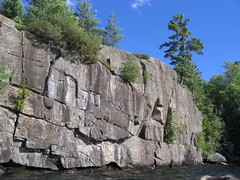Looking to the future I realize that what would make me happiest is writing and practicing photography. I've made some minor gains in the writing field, getting published in some technical and local papers and magazines, and today I feel I've made some in-roads into photography. Though I've been playing on
FLICKR for some time and can find my pictures all over the web, borrowed by travel sites, commercial websites and more, somehow it is once one gets into print that one feels ultimately more satisfied. The great thing about
FLICKR is that the user can not only share photos with the world, but also decide how (and with whom) photos are shared. Beyond that,
FLICKR has teamed up with not-for-profit organization
CREATIVE COMMONS, which allows users to connect a few different licenses to their work. I've given mine an
Attribution 2.0 license, which means that others may copy, distribute or display the work, make derivative works and make commercial use of the work as long as they attribute the work in the manner specified by me, the licensor. Seems like a fair option. We are living in a world that will continue to be defined and shaped by how willing people are to share with one another.
CREATIVE COMMONS' founders understood, when they developed the site, that clear and concise communication is key. For content creators there are several licenses to choose from, and for content acquirers, you can search for works to be used for commercial purposes or works that allow for modification. We're all familiar with the battle begun by music sharing, but what about giving props to pioneers like the Beastie Boys, who offer CD's of their music in Wired magazine for others to adapt and play with, or who send out 50 video cameras into the crowd for concert-goers to document their own experiences, and then create an "open-source" documentary. Brilliant!
CREATIVE COMMONS licenses apply to all sorts of media: video, music, photography and text. So when a young Hungarian writer named Istvan contacted me today about how to credit me for the photography he'll be using on the cover of a book he's publishing about electronic music, I realized I'd chosen to do the right thing by sharing my work with others. I sent him a friendly email back suggesting the credit and he said he'd send me a copy of the book. Quick and simple, all thanks to
CREATIVE COMMONS, where the future is friendly.
from this (image by sookie):

to this (image by Istvan):

 My boss has been dangling the carrot, or should I say title, "Director of New Media", in front of my face ever since the word mobisode was first heard (it’s a mobile episode for those media newbies out there). Working in television, one constantly hears how mobile technology is going to a) change the world b) make us rich, or c) inundate us with more crap content. Take your pick. So far, it's only the broadcasters and rap stars who sell their ring tones that are making money from this technology, not the independent producers like the one I work for. Doesn't mean I'll stop trying to make it happen for them, it's just that my current belief is that mobisodes and podcasts work best as a promotional tool, not as stand-alone content. Frequently I visit the itunes music store's podcast section to see what's new and exciting. In hotspot number 6 this week is Jack Black's Nacho Libre Confessionals. "Exciting!" I thought, as I bypassed everything else and started downloading Jack's podcast, essentially proving my theory that it'll be blockbuster entertainment that will continue to drive demand for mobile entertainment. I watched a few spots of Mr. Black in his photo-booth-like set staring in his rather strange way at the camera as he told us nothing we'd never heard before. Kinda lame, I confess. I love Jack Black, so am I missing something? Am I not getting the joke? Something tells me the studios don't care if it's funny - it's Jack - off-the-cuff - making people relate to him - see a new side of him - feel engaged in the creation of the film. It's cheaper than a publicity tour, it gets people's attention and drives the branding home. So why would they care that it's really just more crap content? They'll make their $100 podcast production budget back a thousand times over. Amazing! Even though the podcast made me want to fall asleep, as a wannabe publicist, I think it's marketing genius.
My boss has been dangling the carrot, or should I say title, "Director of New Media", in front of my face ever since the word mobisode was first heard (it’s a mobile episode for those media newbies out there). Working in television, one constantly hears how mobile technology is going to a) change the world b) make us rich, or c) inundate us with more crap content. Take your pick. So far, it's only the broadcasters and rap stars who sell their ring tones that are making money from this technology, not the independent producers like the one I work for. Doesn't mean I'll stop trying to make it happen for them, it's just that my current belief is that mobisodes and podcasts work best as a promotional tool, not as stand-alone content. Frequently I visit the itunes music store's podcast section to see what's new and exciting. In hotspot number 6 this week is Jack Black's Nacho Libre Confessionals. "Exciting!" I thought, as I bypassed everything else and started downloading Jack's podcast, essentially proving my theory that it'll be blockbuster entertainment that will continue to drive demand for mobile entertainment. I watched a few spots of Mr. Black in his photo-booth-like set staring in his rather strange way at the camera as he told us nothing we'd never heard before. Kinda lame, I confess. I love Jack Black, so am I missing something? Am I not getting the joke? Something tells me the studios don't care if it's funny - it's Jack - off-the-cuff - making people relate to him - see a new side of him - feel engaged in the creation of the film. It's cheaper than a publicity tour, it gets people's attention and drives the branding home. So why would they care that it's really just more crap content? They'll make their $100 podcast production budget back a thousand times over. Amazing! Even though the podcast made me want to fall asleep, as a wannabe publicist, I think it's marketing genius.









